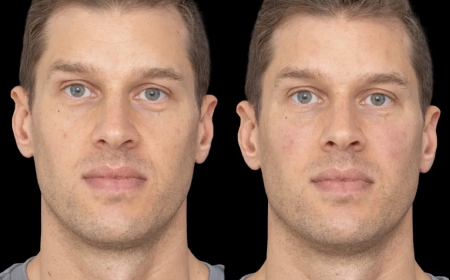The Power of Expert Care: Why You Need an OCD Therapist in San Antonio
This article explores the role of professional therapy in treating OCD, what specialized care involves, and how the right therapist can help you reclaim control over your life.

Living with Obsessive-Compulsive Disorder (OCD) can be exhausting, frustrating, and isolating. Its a condition that extends beyond the occasional urge for cleanliness or orderOCD is marked by persistent, unwanted thoughts and repetitive behaviors that interfere with daily life. The good news is that effective, evidence-based treatment is available. If you're struggling with these challenges, working with an experienced OCD therapist San Antonio can be the turning point in your mental health journey.
Understanding OCD in Depth
OCD is a complex mental health disorder that affects people of all ages and backgrounds. It involves two primary symptoms:
-
Obsessions: Recurrent and persistent thoughts, impulses, or images that are intrusive and cause significant anxiety.
-
Compulsions: Repetitive behaviors or mental acts aimed at reducing the anxiety caused by the obsessions.
Common examples include checking, counting, washing, arranging, or avoiding specific people or situations. These behaviors often offer only temporary relief and can grow more time-consuming and disruptive over time.
A trained OCD therapist San Antonio helps identify these patterns and implement techniques to reduce their hold on your daily life.
Why Specialized Therapy Matters
Not all therapists are trained to treat OCD effectively. General therapy approaches may not address the specific cognitive and behavioral cycles that drive this disorder. A specialized OCD therapist San Antonio brings critical advantages to your care:
-
Proficiency in Exposure and Response Prevention (ERP)
-
Understanding of OCD subtypes and how they manifest
-
Ability to create customized treatment plans
-
Experience in treating comorbid conditions like anxiety, depression, or ADHD
Choosing a therapist with OCD-specific training increases the likelihood of successful, lasting symptom management.
Identifying the Types of OCD
One of the first things your therapist will do is determine your OCD subtype. This allows for a targeted treatment strategy. Some common types include:
-
Contamination OCD: Excessive fears of germs, illness, or environmental toxins
-
Checking OCD: Repetitive checking behaviors (doors, appliances, emails, etc.)
-
Harm OCD: Fear of causing harm to oneself or others
-
Religious or Moral OCD (Scrupulosity): Obsessions involving right vs. wrong
-
Sexual Orientation OCD (SO-OCD): Intrusive doubts about ones identity
-
Relationship OCD (ROCD): Obsessive concerns about a partner or relationship
A knowledgeable OCD therapist San Antonio can distinguish between these types and offer a therapy plan thats suited to your unique presentation.
Key Treatment Options for OCD
Exposure and Response Prevention (ERP)
ERP is the frontline treatment for OCD. It involves exposing the individual to feared thoughts or situations without allowing the compulsive response. Over time, this reduces anxiety and desensitizes the brain to perceived threats.
For example, someone with contamination OCD might be gradually exposed to surfaces they perceive as dirty without immediately washing their hands. Over time, the urge to wash decreases.
Cognitive Behavioral Therapy (CBT)
CBT helps individuals identify and reframe distorted thinking patterns. While ERP is considered the gold standard for OCD, CBT complements it by improving cognitive flexibility and reducing irrational beliefs.
Acceptance and Commitment Therapy (ACT)
ACT encourages mindfulness, acceptance of uncomfortable thoughts, and alignment with core personal values. This can be especially helpful for clients who struggle with shame, guilt, or identity-related obsessions.
Medication Support
Therapists may work in tandem with psychiatrists for medication management. Selective Serotonin Reuptake Inhibitors (SSRIs) are commonly prescribed and can help reduce symptom severity when combined with therapy.
Benefits of Working With an OCD Therapist Locally
Choosing a local OCD therapist San Antonio provides unique advantages:
-
Familiarity with regional healthcare systems
-
Easier in-person appointments and scheduling
-
Access to nearby resources such as group therapy or psychiatric referrals
-
Greater consistency in care and follow-up
Additionally, many local therapists offer virtual therapy for flexibility, allowing you to attend sessions from the comfort of your home.
The First Steps: What to Expect in Early Sessions
If youre new to therapy, its natural to feel nervous or unsure. An OCD therapist San Antonio will walk you through a clear, structured process:
-
Initial Assessment: Includes mental health history, OCD symptom review, and discussion of past treatments.
-
Goal Setting: Identifying realistic short-term and long-term objectives.
-
Treatment Planning: Establishing which therapy methods to use and how progress will be tracked.
-
Therapy Begins: Regular sessions that focus on ERP, thought restructuring, and behavior change.
Consistency and honesty are keyyour therapists role is to guide without judgment.
Everyday Strategies to Reinforce Therapy
In addition to formal therapy, building daily coping tools can make a significant difference. Some useful habits include:
-
Mindfulness meditation to calm intrusive thoughts
-
Keeping an OCD journal to track triggers and progress
-
Limiting reassurance-seeking from friends and family
-
Setting small goals for resisting compulsions
-
Developing hobbies or routines that promote focus and relaxation
Your OCD therapist San Antonio may also assign homework to reinforce lessons between sessions.
Family and Partner Involvement
OCD can affect not just the person experiencing it, but also those around them. Partners and family members may inadvertently reinforce compulsions or feel overwhelmed by the symptoms. Involving them in therapy can:
-
Improve understanding of the disorder
-
Reduce accommodation of compulsive behaviors
-
Provide a support system that aligns with your treatment plan
Many therapists include family education as part of the therapeutic process.
Long-Term Outlook and Recovery
OCD is a chronic condition, but that doesn't mean it has to dominate your life. With proper treatment from a skilled OCD therapist San Antonio, many individuals experience dramatic improvements in function and quality of life. Progress may be gradual, and setbacks are normalbut with the right tools and support, sustained recovery is absolutely possible.
Therapy teaches not just symptom management but resiliencegiving you the ability to face fear without being controlled by it.
Final Thoughts
OCD can feel overwhelming, but you dont have to navigate it alone. A dedicated OCD therapist San Antonio offers the training, compassion, and structured approach needed to reduce compulsions and regain peace of mind. Whether you're just beginning to seek help or have tried other therapies before, a specialized therapist can provide the clarity and direction that truly makes a difference.
Take the next step toward better mental healthreach out to a professional who understands the complexity of OCD and is committed to guiding you through it.



































